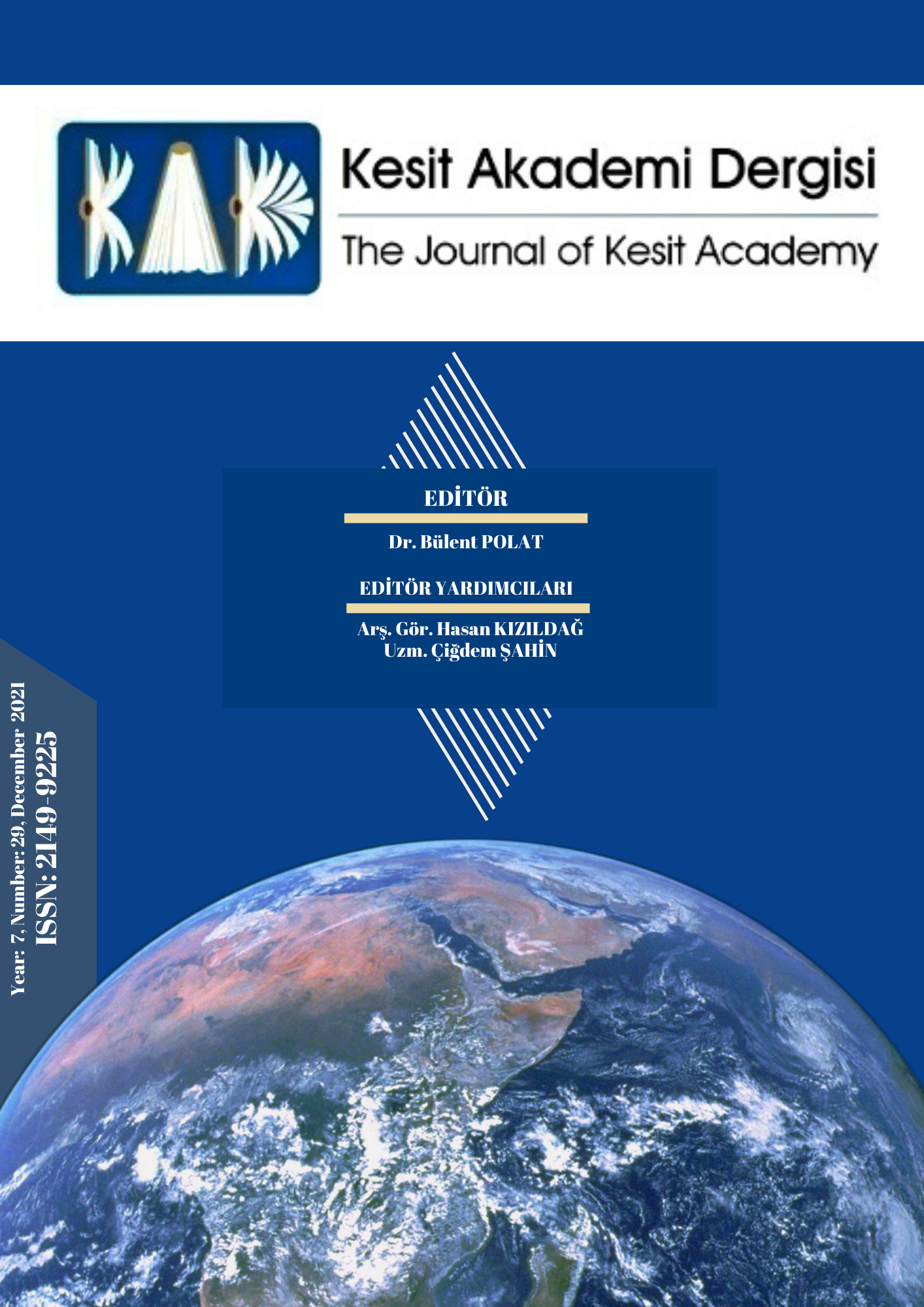Author :
Abstract
Bu araştırmanın amacı uzaktan eğitim faaliyetlerini veli görüşlerine göre betimlemektir. Araştırmada nicel araştırma tekniklerinden betimsel tarama modeli kullanmıştır. Örneklem grubu her kademeden basit seçkisiz örneklemle seçilen 2544 veliden oluşmuştur. Veriler Google forms üzerinden velilere gönderilmiş, SPSS 21.0 programıyla analiz edilmiştir. Araştırma verilerinin analizinde betimsel istatistikler olan aritmetik ortalama, frekans, standart sapma ve yüzde değerlerine bakılmıştır. Gruplar arasında anlamlı fark olup olmadığını belirlemek için Tek Yönlü Anova testi ve post hoc testi olarak Tukey testi kullanılmıştır. Araştırma sonunda uzaktan eğitim faaliyetleriyle gelir durumu, veli öğrenim durumu, yerleşim birimi, çocukların öğrenim gördüğü kademeler arasında anlamlı farklar olduğu ortaya çıkmıştır. Velilerin uzaktan eğitimden memnun olduğu ancak bu memnuniyete rağmen yüz yüze eğitimi daha çok tercih ettikleri bulgularına da ulaşılmıştır. Bakanlığın eğitimde fırsat eşitliğini sağlamak ve uzaktan eğitim hizmetlerini daha verimli hale getirmek için dezavantajlı gruplar başta olmak üzere daha fazla adım atmalı, uzaktan eğitimde velilerin yaşadıkları sorunlara daha hızlı çözümler üretmelidir.
Keywords
Abstract
The aim of this research is to describe the distance education activities according to the parents' opinions. In the research, descriptive survey model was used, one of the quantitative research techniques. The sample group consisted of 2544 parents who were selected with a simple random sample from all levels. The data were sent to parents via Google forms and analyzed with the SPSS 21.0 program. In the analysis of the research data, descriptive statistics such as arithmetic mean, frequency, standard deviation and percentage values were examined. One-Way Anova test and Tukey test as post hoc test were used to determine whether there was a significant difference between the groups. At the end of the study, it was revealed that there are significant differences between distance education activities and income level, parent education level, residential unit, and the stages where parents' children are educated. It was also found that and parents are satisfied with distance education, but despite this satisfaction, they prefer face-to-face education more. In order to ensure equality of opportunity in education and to make distance education services more efficient, the Ministry should take more steps, especially for disadvantaged groups, and produce quicker solutions to the problems experienced by parents in distance education.
Keywords
- Alkan, (1981). Açık üniversite: Uzaktan eğitim sistemlerinin karşılaştırmalı olarak incelenme- si. Ankara.
- Balcı, A. (2020). Covid-19 özelinde salgınların eğitime etkileri. Uluslararası Liderlik Çalışimaları Dergisi, 3 (3), 75-85.
- Bayrak, M., Aydemir, M. ve Karaman, S. (2017). Uzaktan eğitim öğrencilerinin öğren- me stilleri ve doyum düzeylerinin incelenmesi. Çukurova Üniversitesi Eğitim Fakültesi Dergisi, 46 (1) , 231-263. https://doi.org/10.14812/cuefd.310022.
- Bozkurt, A. (2017). Türkiye’de uzaktan eğitimin dünü, bugünü ve yarını. AUAd, 3(2), 85-124.
- Büyüköztürk, Ş., Çakmak, E., K, Akgün, Ö., E, Karadeniz, Ş. ve Demirel, F. (2008). Bilimsel araştırma yöntemleri. Pegem Yayıncılık.
- Çoban, S. (2013). Uzaktan ve Teknoloji Destekli Eğitimin Gelişimi. XVI. Türkiye’de İn- ternet Konferansı Bildiri Kitabı. Anadolu Üniversitesi İletişim Bilimleri Fakültesi, Eskişehir.
- Gezer, M. ve İlhan, M. (2018). Akademisyenlerin perspektifinden Türkiye’de eğitimde fırsat eşitsizliğine neden olan faktörlerin sıralama yargılarıyla incelenmesi. Yükseköğretim Dergisi, 8 (3), 301-312.
- Gören, S., Gök, F., Yalçın, M., Göregen, F. ve Çalışkan, M. (2020). Küresel salgın süre- cinde uzaktan eğitimin değerlendirilmesi: Ankara örneği, Milli Eğitim Dergisi, Salgın Sürecinde Türkiye'de ve Dünyada Eğitim, 69-94 .
- Hızal, A. (1983). Uzaktan öğretim süreçleri ve yazılı gereçler: Eğitim teknolojisi açısından yaklaşım. Ankara Üniversitesi Eğitim Bilimleri Fakültesi Yayınları.
- Karip, E. (2020). Covid-19 sürecinde eğitim:Uzaktan öğrenme, sorunlar ve çözüm önerileri. Türk Eğitim Derneği Yayınları.
- Keskin, M. ve Özer-Kaya, D. (2020). COVID-19 sürecinde öğrencilerin web tabanlı uzaktan eğitime yönelik geri bildirimlerinin değerlendirilmesi. İzmir Kâtip Çelebi Üniversitesi Sağlık Bilimleri Fakültesi Dergisi, 5(2), 59-67
- Koç, E. (2020). An evaluation of distance learning in higher education through the eyes of course ınstructors. Akdeniz Üniversitesi Eğitim Fakültesi Dergisi, 3(1), 25-39.
- MEB (1960). Mektupla öğretim merkezi açılması hakkında genelge (1960/5367). Tebliğ- ler Dergisi, 12(23), 131.
- MEB. (2020). Milli eğitim istratistikleri. Milli Eğitim Bakanlığı Strateji Geliştirme Başkanlığı.
- MEB. (2020). www.yegitek.meb.gov.tr. www.meb.gov.tr: http://yegitek.meb.gov.tr/www/sayilarla-uzaktan-egitim/icerik/3124.
- The World Bank Report Education. (2020). The Covid-19 pandemic: Shock to education and policy responses. World Bank Group.
- Toptaş, E. (2001). Uzaktan eğitim ve kütüphanecilik bölümlerinde uygulanması: A.Ü. Dil ve Tarih-Coğrafya fakültesi kütüphanecilik bölümü için bir model [Yayınlanmamış Yüksek Lisans Tezi]. Ankara Üniversitesi.
- TUİK. (2019). Hanehalkı bilişim teknolojileri (BT) kullanım araştırması, 2019. https://data.tuik.gov.tr/Bulten/Index?p=Hanehalki-Bilisim-Teknolojileri-(BT)
- Kullanim-Arastirmasi-2019-30574 adresinden alınmıştır.
- UNESCO, (1987). Distance learning systems and structures: Training manual. Volume II. Bangkok: Unesco Regional Office for Education in Asia and the Pacific, UNESCO. (2020). National education responses to Covid-19:Summary report of
- Uşun, S. (2006). Uzaktan eğitim. Ankara: Nobel Yayıncılık.
- Yılmaz İnce, E., Kabul, A. ve Diler, İ. (2020). Distance education in higher education in the COVID-19 pandemic process: A case of Isparta Applied Sciences University. International Journal of Technology in Education and Science (IJTES), 4(4), 343-351.
- Yılmaz, E, Güner, B. (2020). Farklı öğrenim kademelerindeki öğrencilere verilen uzak- tan eğitim hizmetinin veli görüşlerine göre değerlendirilmesi. Milli Eğitim Dergisi, Salgın Sürecinde Türkiye'de ve Dünyada Eğitim, 477-503.





